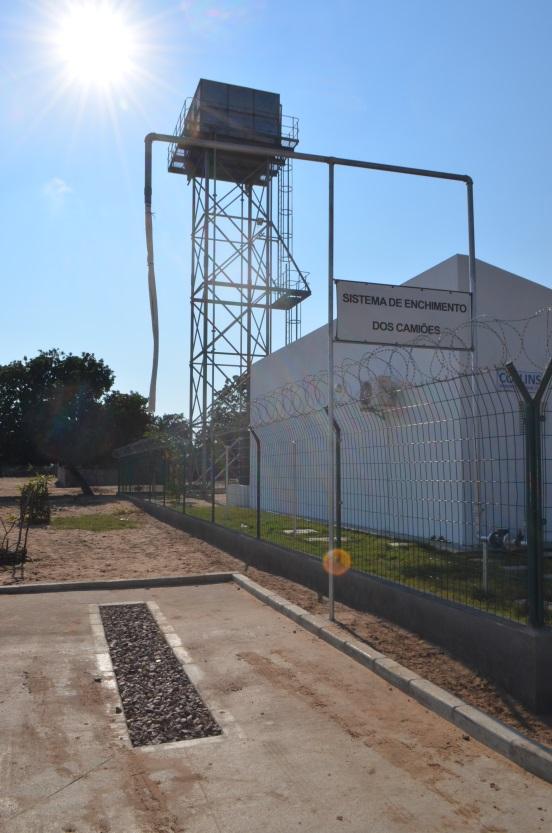The Water Supply System in Tomanine: One Year Later
Last year, Enabel joined
Governor Stella Pinto at the inauguration of the water supply system in the
village of Tomanine in Guijá district in honour of World Water Day. One year
later, a delegation of Enabel and two delegates from the Mozambican government
returned to see how the community is dealing with the water supply system
constructed by the Enabel Gaza project.
Upon arrival in the town of Tomanine, the manual pump that was used so frequently before Enabel’s
intervention appeared to be completely out of use, an observation that was confirmed by the community. There also seemed
to be more livestock in the village, which could be a consequence of the
availability of drinkable water. Furthermore, the community members became more
and more interested in having water taps even closer by home. A Mozambican
private company was appointed for the installation of these taps. The private
“family” water taps are shared between approximately ten families and managed
within themselves by a small committee who keeps track of every family’s
consumption. Apart from this kind of taps, the company has also started with
installing water taps in a private house for one family only, which is the type
of tap we are familiar with. The price for the tap water is very affordable:
approximately 50 eurocents per m³ with a fixed minimum payment of 85 eurocents.
Since the start of this
initiative in June 2017, 160 of these private “family” connections were
installed, as well as 12 private house taps, bringing the total to 172 private
(family/house) connections. However, due to lack of payment the management of
the water network shut down the water supply for these private users. For the
families this clearly marked a break with the past, as this time payment
backlog would not be tolerated anymore. Furthermore, the appreciation of easy access to water by the
families led to an agreement to restart the water supply in return for reliable
payments. Currently, the company is preparing the installation of 85 new
private (house) connections. These family and house private water taps make up two
out of four possibilities for the community to obtain drinkable water. There
are still two community fountains, open to any community member of which the
sale is managed by a small Water and Sanitation Committee. Lastly, there is a
water fill station for trucks: the truck pays at the station and sells the
water in surrounding villages where there is no clean water.
The delegation held a final stop
in the village of Chinhacanine where Enabel is building a similar construction
to the one in Tomanine. There are two tanks of 150 000 liter each and an
elevated tank on 20 meter height with a content of 60 000 liter. The latter will provide water
to the people living in the higher areas. Moreover, the water network will
supply to the private network (such as the hospital and other private
suppliers), which currently has troubles with water cuts and low-quality, even
undrinkable water. The mixture with the
new water supply network will ensure an automatic 24/7 supply of drinkable
water, as the fusion with the high quality water of Enabel’s project will turn
the “private” water clean and drinkable.
The water will be provided from
three wells and will be distributed to the community through taps: per ten
families there will be one tap. In the end 12,000 people will benefit from
drinkable water, although the project is struggling with some delays. Therefore,
the project is putting a lot of effort in community
outreach by providing information, working and talking with the inhabitants thus
preparing them for the new supply systems. This social aspect is taking more
time than expected, but is nevertheless very important.
The visit to Tomanine showed some of the success and sustainability of the Water Gaza
project. The increasing demand for private connections demonstrates that families
in Tomanine strongly value easy access to drinkable water. This is facilitated
by the very reasonable prices of the new water supply system. The project puts
considerable emphasis on its sustainability, by ensuring the partnerships with local
companies, communities and government. Lastly, access to drinking water,
incorporated in Sustainable Development Goal 6, has improved the general
livelihood of these families, with a positive impact on health[1]
(SDG 3) and on the production of livestock in the village (linked to SDG 1:
zero poverty, and SDG 2: zero hunger).
[1] The
consumption of salty water can cause dehydration and kidney infections.
Moreover, this salty groundwater can damage the pipe and pump system and the
erosion of the water supply system might cause metallic parts to enter the
water, causing cancers, cardiovascular diseases and many other health issues.
This article was written by Anke Van de Velde with the valuable input of Hélder Cumbi and revised by Evert Waeterloos.
Latest news from this project
No news

